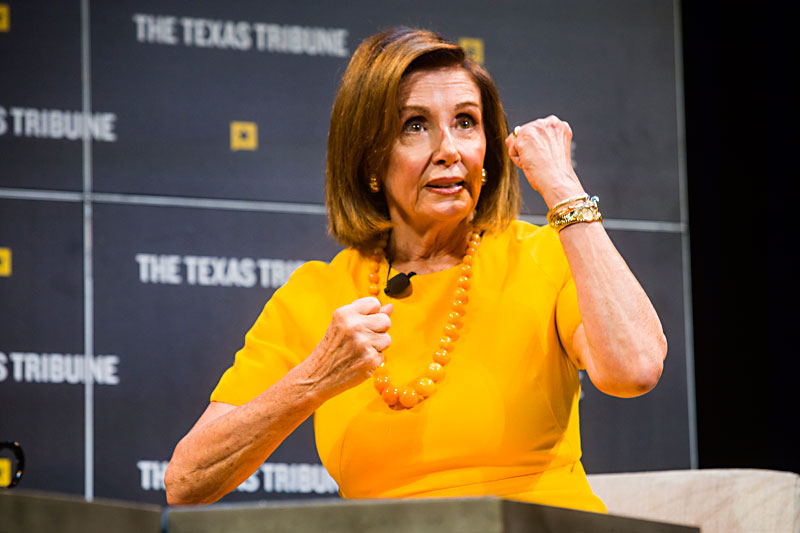Julián Castro, Women of Color, and Texas 2020
The path toward turning the state blue
By Mike Clark-Madison, Fri., Oct. 4, 2019

Every seat in the house is taken at Tamale House East on a steamy Saturday morning, almost all by women of color. Some are there to quietly translate for their monolingual tablemates (both English and Spanish) the proud claims to power from the nationally known activists onstage, the calls to action from the women in the crowd, and the promises from Julián Castro, the man who would be president. Others are there to represent: local advocates and activists from Workers Defense Project, Austin Justice Coalition, Planned Parenthood, and elsewhere. The women who own Tamale House are there too, making their own statement on an East Sixth Street that has changed so much around them, with white hipsters all about. There are enough tacos for everybody.
All have been convened here by Supermajority, which has brought its star power and its giant orange-and-pink bus to the Eastside on a national kickoff tour to bring women – especially these women – to the center of the political stage. The advocacy group's rollout is designed to highlight its five "Majority Rules" as the planks of an accountability agenda: 1) Our lives are safe, 2) our bodies are respected, 3) our work is valued, 4) our families are supported, and 5) our government represents us.
These are bound together by "the Super Rule": "The lives and experiences of women – particularly women of color – are front and center in addressing all of our nation's challenges. From climate change to immigration to criminal justice reform, the people most impacted must be at the forefront of the solutions." While Supermajority is a long-term effort, this organizing and educational push, building on the 2018 momentum that sent the first two Latinas from Texas to Congress, has a pretty good head of steam right now. If you're running for office – especially if you're running for president – you should try to be on the bus rather than under it.
"Our expectation is that women are going to decide this election," says Supermajority co-founder Cecile Richards, hometown hero and former president of Planned Parenthood and the Planned Parenthood Action Fund. "And if you want them to support you ... if you want to govern, you need to understand what's on the minds of women."
Julián Castro sits quietly, somewhat dutifully, on the stage – not like he doesn't want to be here, but like he knows how to act in a room full of women who have much in common with the strong single mother and grandmother who raised him and his brother, Joaquin (the congressman, the one now sporting a beard), an essential biographical element of all his campaign narratives, from daily fundraising appeals to the national debate stage to this plática here at Tamale House. This day will take him from Austin to San Antonio – to see his mother Rosie Castro, herself a Democratic organizing legend, we are assured – and back again before nightfall. He'll be under the hot lights at the Texas Tribune Festival later, but he's under equally close scrutiny now from these women, many of whom would very much like to put their trust in him.
People Can Do More Than One Thing
The Supermajority events have a fairly tight, scripted format, as befits a media tour. Another will be held later in the afternoon, while Castro's onstage at the Paramount, with Beto O'Rourke, who is at this moment just getting off that same stage. Later in the week, in Nevada, they will connect with Elizabeth Warren and Kamala Harris. For the moment, though, despite the step and repeat behind them and the camera live-streaming the proceedings from the Tamale House kitchen and the big bus parked out front, they've achieved a relaxed and neighborly vibe in this room, where Castro has surprisingly never been but Richards is a fixture when she's in town. She says her late and sainted mother would be, too, and suggests that the chilaquiles are better than in San Antonio, at which the former Alamo City mayor naturally bristles. A skirmish in the Taco Wars is quickly averted.
Castro knows what to expect in terms of questioning. As women stand and deliver their stories and queries, each tied to one of the five Majority Rules, he gets to hit on his key campaign trail points, ranging from reproductive rights to education (including the universal pre-K he made his signature issue as mayor) to workers' rights (starting with a $15 minimum wage) to immigration. "What we've seen in the last two years is a record of tremendous cruelty, and I have no doubt that undocumented women have borne the brunt of that pain," he says as he promises to put all immigrants, regardless of status – not just Dreamers and their families – on a pathway to citizenship.
Here on the New Eastside, Castro also talks housing, his portfolio in the Obama cabinet, and gentrification. "We need to invest in housing that is affordable to the poor, the working poor, and the middle class," he says, touting his plan to create 3 million new affordable units (is that all?) over 10 years. "In a city like Austin, you've seen so many people driven out of this city over 20 years. It's had a profound effect on people of color." Castro's housing strategies, including a refundable tax credit for renters and an offer of housing choice vouchers (the former Section 8) to everyone up to 50% of median family income, would certainly create a lot of subsidized demand for new affordable housing, which may – even in, let's call it, an uncertain regulatory environment like Austin – do enough to achieve and exceed his modest supply goals.
Much of Castro's issues talk is, frankly, not really holding the attention of the room. This has been somewhat true of his entire presidential campaign, as his unshakable air of studious wonkishness and faint wariness – the caution that has frustrated Texas Dems who would like more impassioned leadership and ambition from the Castro brothers – has allowed him to garner a core of devoted fans but not a lot of interest from average voters. When he has gotten attention by going assertively after his opponents on the debate stage – first Beto O'Rourke, then Joe Biden – he has suffered some blowback for looking like a Mean Kid, partly because such moments do come off to many as forced and out of character.
Castro's presidential campaign is struggling by any measure; he's in danger of missing the November debate stage, and money is tight, although his campaign touted the quarter with joy and pride on Monday as its best fundraising quarter ever. (The quarter ended Monday, Sept. 30; results from candidates at all levels are slowly being announced.) Iowa and New Hampshire, and then Texas, are still months away; the contest here officially kicks off Feb. 18 with the start of early voting, which is actually before the contests in Nevada (where Castro is making a big stand) and South Carolina. Then comes Super Tuesday.
Right now, everything seems further away than it already did, as the inevitable collapse of the Trump regime into an impeachment mud pit sucks all the oxygen out of the room. "We can walk and chew gum at the same time," Castro says. "All of us who are running for president are out there every single day across America articulating our own visions – how do we put more people to work and deliver improved health care and better education and housing? We can do all that and still hold this president accountable. People can do more than one thing."
Like O'Rourke, Castro obviously thinks he's got a Texas advantage. "There's a tremendous amount of energy in Texas because it's going to be a swing state in 2020," he tells us at TribFest later in the day. "All of the polling in Texas right now shows several Democrats, including me, being very competitive with Donald Trump in Texas, and if we win Texas and these 38 electoral votes, it's game over. And I'm convinced that if I'm the nominee, I'm going to be able to come here and beat Donald Trump in 2020, as well as get the 29 electoral votes of Florida and the 11 of Arizona," the two other Latino-heavy swing states in play.
Unlike O'Rourke, though, Castro doesn't have, as of yet, a plausible path to victory in the Texas primary. He's never run statewide here before, let alone just last year as Beto did, and his poll numbers here aren't much better than his scant national showing. His Tamale House visit may be the last time the women convened by Supermajority see him as a presidential candidate. But that doesn't really matter all that much. Here, he is a son and brother to them, a champion for them and the values and issues and policies that matter to them, and for these women and the Latinas of Texas they represent, this may be the first time that's ever happened.
"Very Wholesome for Our Nation"
To turn Texas blue, a goal everyone from Nancy Pelosi on down threw their weight behind this past weekend, is really, in the long run, to turn it black and brown, as well as female. Whether she knew it or not, that's what Madam Speaker conveyed when she told her crowd at the Paramount at TribFest's closing keynote that "Texas is our hope for the future. I'm not just talking about Democrats, I'm talking about the country and the world. When Texas goes blue and people have to pay attention to everything that happens here – the views of all the people here – that's going to be very, very wholesome for our nation."
In the completely gerrymandered and voter-suppressed environment in which we live (a point Pelosi stressed repeatedly) and with our president going apeshit several times a day and covering down-ballot Republicans with debris, the most tempting Texas targets right now are in the suburbs, where the Red Team has suddenly become radioactive. Certainly, Trumpism is wearing mighty thin on college-educated white women in those communities, who already vote often; coaxing them to break blue is a quicker maneuver to execute than the kind of ground-up organization of younger women and women of color, who often haven't voted as much, for which Supermajority is trying to make space.
This divergence of paths to victory is, in their public-facing positioning, not much of a problem (or perhaps a good problem to have) for all the women, regardless of color or connections to the party establishment, campaigning to make 2020 a landmark year for Democratic sisterhood. But it does mean making real choices about who to back in which races and what kinds of campaigns to run, and it's generally surmised that the path to an increased Democratic majority under Pelosi – and to control of the Texas House – tacks more to the center, toward the white moms in the suburbs, than to the woke progressive left, which is where most of the Supermajority sisters are and, increasingly, where Castro and O'Rourke are.
Cheri Bustos, the downstate Illinois rep who chairs the Democratic Congressional Campaign Committee and whose own district was carried by Trump in 2016, was also at TribFest with her GOP counterpart, Tom Emmer of Minnesota, in a panel that quickly devolved into a noisy talking-point spat over impeachment, shedding more heat than light. The fact that there are any DCCC staffers and moves being made in Texas at this point is still a bit startling, but Bustos' team is already ruffling feathers on the left.
In TX-10, Austin's Michael McCaul has enough seniority, power within Congress as a national security expert, and personal money (he married into the iHeartMedia – formerly Clear Channel Communications – fortune) to continue to ride out the blue wave, unlike the more fragile incumbents who've abandoned their seats in the "Texodus" of GOP congressmen, now numbering six for this cycle after six others bailed in 2018. Former Austin Assistant City Attorney Mike Siegel, the Bernie-adjacent 2018 Democratic nominee who came within four points of victory, is nonetheless not-so-subtly being overlooked by the DCCC as he now aims to survive a three-way primary. And Jessica Cisneros, the young, energetic, progressive attorney running in the primary against the left's least favorite Texas Democrat Henry Cuellar in the Laredo-based TX-28, has absolutely no hope of support from the powerful D.C. women atop the DCCC power structure. "Of course. That's the easiest question you could ask me," Pelosi told Texas Tribune CEO Evan Smith when he asked if Cuellar had her backing, as the congressman watched from the fifth row.
But there are more comfortable seats where the two Democratic agendas can be brought into harmony. Sri Preston Kulkarni, the Houston-raised son of an Indian father and Anglo mother, is running in TX-22, the "NASA district" once held by Tom DeLay. As he pointed out at TribFest, his five-point loss in 2018 – close enough to scare incumbent Pete Olson out of a rematch, thus beginning the "Texodus" – was made possible by organizing within the vast number of immigrant communities in one of the most diverse districts in the nation, many of whose members had never been asked to take part in the political process before by either party.
Kulkarni was on a panel with three women – Wendy Davis, Gina Ortiz Jones, and Kim Olson (no relation to Pete) – who are also running with a vengeance to flip marginal Republican congressional seats in the suburbs. (In Ortiz Jones' case, the district includes suburbs of both San Antonio and El Paso, with about eight hours' worth of West Texas in between.) He acknowledged that the Big Blue Energy on the stage and in the room and throughout the state is largely female. "I'm honored to be here onstage with these women," he told the crowd.
Ortiz Jones then took care to draw the line directly back to Davis' phenomenal filibuster to defend reproductive rights, which inspired so many women on the Texas left, and her subsequent doomed-but-not-fruitless race for governor in 2014 as laying the groundwork for Ortiz Jones' own race. "I am humbled," she said to Davis as she recounted the gains made by Democratic organizers ever since – Battleground Texas, Jolt, the Texas Organizing Project, and many more – who tapped into the energy first unleashed by Davis, then made furious by Trump's victory, then powering 2018's gains both within and without O'Rourke's Senate campaign. "We're building on the progress we've already made, which we need to, because the one out of 10 kids in the U.S. who call Texas home deserve the best."
For Castro and O'Rourke, for the congressional aspirants, for the Dems who flipped 12 seats in the Texas House in 2018 (and need to hold them), and for the candidates seeking to flip nine more to take control of the chamber, the road to victory runs through the crowd at Tamale House, says Richards. "Look at the room today," she tells us. "These are the women who are at the forefront of organizing everything, from economic justice to reproductive justice and beyond. The exciting thing is, when you put these women in one place together, you see how women – and particularly women of color – hold the keys to changing what has been, honestly, a completely unrepresentative government in Texas for a long, long time. These women are ready to make that look very different in 2020."
Got something to say? The Chronicle welcomes opinion pieces on any topic from the community. Submit yours now at austinchronicle.com/opinion.











